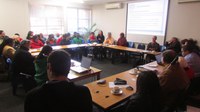An integrated approach to housing allocation is needed – roundtable
These roundtable discussions, which took place on 13 and 18 June 2014, were part of the meaningful engagement on housing demand and allocation in South Africa organised by the Socio-Economic Rights Project of the Community Law Centre, University of the Western Cape.
Community members pointed out that the Batho Pele principles will serve to ensure that the housing delivery process is not manipulated and that all relevant information is freely available to the people. They also said that an integrated approach to housing allocation is needed. It is feared that having the provincial departments, ward councillors, accredited municipalities, community liaison officers and other government agents all involved in housing raises the danger of creating parallel systems that would further compound housing problems. Parallel systems would also create further confusion.
They also said subsequent research on housing allocation should include a gender dimension and examination of the role of gender in housing resources and allocation. There is urgent need to assess the Housing Demand and Allocation Policy, which was introduced about five years ago.
The discussions focused on the recommendations contained in a research report by the Community Law Centre and the Socio Economic Rights Institute of South Africa entitled ‘Jumping the queue’, waiting lists and other myths: Perceptions and practice around housing demand and allocation in South Africa. The report focuses on the Housing Demand Database system and housing allocation in Gauteng and the Western Cape. These two provinces were selected mainly because of their volume of housing demands and because both have their own housing databases in place.
At the end of the roundtables the participants acknowledged that there is need for continuous meaningful community engagement in order to translate housing policy into practice.
The roundtables ended on a good note, with officials from City of Cape Town who participated in one of the roundtable discussions committed to a follow-up meeting to facilitate meaningful engagement with communities in order to clarify existing housing allocation policies, processes, and systems. This will go a long way in educating the communities and fostering the spirit of transparency.
These roundtables had participants from various sectors, including representatives of civil-society organisations, policy makers, property developers, people from informal settlements and disadvantaged communities and government officials from key departments such as the Departments of Performance Monitoring and Evaluation, The Presidency: Outcomes Monitoring and Evaluation, and the Evaluation and Research Unit and National Department of Human Settlements.
Other participants included the Gauteng Provincial Office of the South African Human Rights Commission, the Housing Development Agency, Statistics South Africa, TopRoot Properties, Studies in Poverty and Inequality Institute, FinMark Trust, Socio-Economic Rights Institute of SA and the Council for Scientific and Industrial Research.

